

|
Making a Drama out of a Crisis : George Pelecanos talks to Shots Ezine© Ali Karim |
If youíre not familiar with George Pelecanos, check out our previous interviews and links in our archive :-
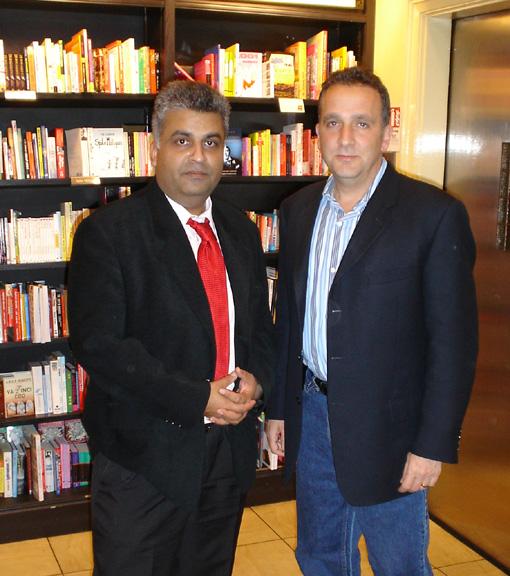 |
|
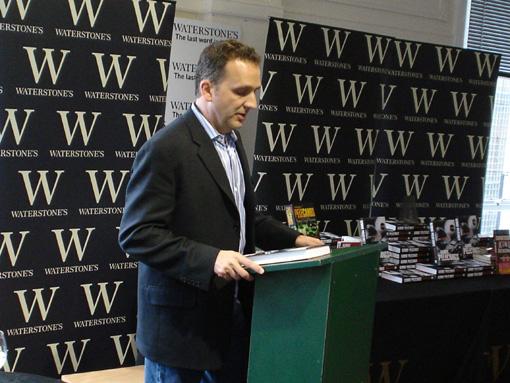
|
|
|
George, good to see you again man! And great to see you Ali; man I love Shots Ezine! |
|
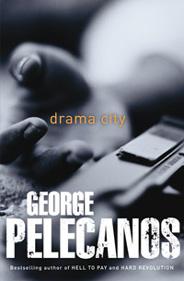
|
This time last year you told me that youíd just finished your 13th novel Drama City. Tell us what inspired you to write this particular story? Basically the genesis of the story came from the radio. I was listening one day and I heard about these guys who had just come out of prison. They were talking about their lives and it really held my attention. Shortly after I was reading in the newspaper about a program in prison where inmates work with animals, training dogs for the blind and so on, and these guys had a lower rate of re-conviction once they left prison. So perhaps these were people who were basically good, but had made a bunch of mistakes. That gave me the idea for a book, because most who leave prison do jobs like labouring, landscape gardening, painting and decorating and so forth, but I thought what if a guy who left prison really liked working with animals, and wanted to continue working with animals once back in society? Perhaps working for the Humane Society pulling abused animals off the street, breaking up dog fights, etc. So I went to the Humane Society and asked a woman who worked there whether she would hire someone like that. And she said she would, so I had a book and it was as simple as that; all I had to do now was the research. I got to ride with these guys for a couple of weeks, going to parts of the city where they were pulling the dogs off people, so there was a lot of conflict. I also rode with the probation officers. |
|
Did you see any dog fights while you were out researching? I saw the remnants of dog fights. We would go to places that had hosted dog fights; it wasnít pretty, there would be blood on the walls, on the floors, syringes, malt liquor bottles and that stuff. I saw dogs that had been involved in dog fights, lacerated pups…it was pretty grim, but also very interesting to see what really goes on in our dark alleyways at night. |
|
|
Many writers often donít realise the subtext in their work. Did you consciously realize the metaphor about Lorenzo Brown being a Humane Society Officer? Well I found it during the course of the book. Thereís actually a scene when they talk about the dogs that have to be put down versus the ones that can be saved. I donít actually feel this way, but Lorenzo comes to feel that one of the bad guys, Rico Miller, is like one of those dogs that cannot be saved, and something has to be done about him. The idea is that itís not Ricoís fault that he is the way that he is; heís like a pitbull, a dog that has been trained to attack, so perhaps Ricoís environment has made him who he is, and perhaps, in Lorenzoís eyes, heís beyond saving. |
|
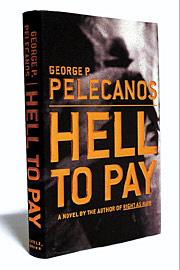
|
Tell us a little about Rachel Lopez, Lorenzoís parole officer? Especially as strong female leads didnít feature significantly in your early books… Come to think of it Ali, strong female leads donít feature in any of my work…until now…Yes it was a challenge, I have felt that my books have been getting stronger as I get away from myself. I felt that way about the Derek Strange books. I really went to a new level there as Strange is nothing like me, and I wanted to try the same thing with a female character. I did get some help. I talked to some people I know. I called Laura Lippman up and she helped me, especially in scenes where Rachel is cruising the bars, I told her Iím lost here, I have no idea what itís like to be a woman having sex, can you help? I wasnít trying to embarrass her or anything, I just asked her to point me in the right direction. She told me about some erotica that I should check out, which I did and then I called an old female friend of mine, whoís still single and I asked her about what sheíd wear in a bar, lipstick and perfume, and she was very helpful. One thing I didnít want to do was to get it wrong. I often read books written by men which feature women who really are men with womenís names - you know, they have the same traits as men, same appetites as men, I didnít want to do that, and hopefully Iíve been successful. It was also helpful that the parole officer that I went around with was a woman. I observed her and it was interesting as she was an attractive woman who deliberately made herself unattractive while on the job. |
|
I read in an interview you did with John Connolly that you had a terrible accident with a handgun when you were a kid. Is this why handguns feature heavily in your work, and many of your characters get shot in the face? And would you care to talk about it? I donít want to exploit it thatís for sure, though I have no problem talking about it. I will say this - itís not that unusual a thing if you live in America, just pick up a paper once a week and youíll see what happened to me is tragically not that uncommon. There was a gun in the house, I was a teenager, I was skipping school with a friend of mine, my parents were at work… Earlier I had loaded the gun with one bullet in the chamber. Later in the day we were sitting together on the end of my parentís bed, as close as you and I are here, and I pointed the gun and started clicking off rounds. I was not thinking… |
|
|
George, how old were you man? I was seventeen and he was sixteen. The bullet hit him right in the face and blew out from the back of his neck. |
|
|
Jeez. The good news is that he lived, and I baptized his daughter. He lives near me and heís still my best friend. So basically that incident still haunts me and shows up in my work I guess. It was pointed out to me by someone just like you who asked me why so many characters in my books get shot in the face. It was something I didnít realise until he said it. What I saw that day is something that I will never forget because it was much more horrible than you can ever imagine. Thatís why I never make light of violence in my books. I donít like the James Bond violence when someone makes a jokey comment after killing someone. |
|
|
You spent some time in South America - can you tell us about that and how it affected your writing and view of the world? Because once you started Right as Rain and the rest of the Derek Strange books, there seemed to be a greater emphasis on social commentary. Thatís absolutely true; in fact we adopted our first son from Brazil, but we didnít go down there. But for my second son we actually went down to Brazil and in fact we got stuck there for a few months. It was the first time I saw hungry children on the streets; children eating out of bins and dumpsters out on the street, some kids lying down on the street because they were too tired to move. I also saw murderous kids, you could see it in their eyes, they would kill you because they were hungry. They did not care, it really influenced me. |
|
|
Yes, there is a bleakness in your work, a vacuum in some of the people that populate your books, despite you trying to give an upbeat message. Well yes, but itís not just in Brazil. When I came back to the USA, I realised that the same thing is happening in our country but it is behind closed doors because of welfare. But welfare hasnít solved the problem, kids are still going to bed hungry, and there is no opportunity, the lack of family leads them to crime and drugs, itís happening all over America. |
|
|
You have a family now, so how does that affect how you write, both from a practical sense and also from an emotional standpoint? Practically it hasnít changed me, because I have always been able to write with my kids around me. I sort of thrive on that; they like to mess with me as Iím working, it doesnít bother me, in fact if itís too quiet I canít work! On the emotional side, yes it has affected me. I know you said that there is bleakness in my work, but there is always hope too. |
|
|
I read in the Guardian a somewhat controversial review of Drama City: ĎRumour is that Drama City will be his last novel for some time, as his US publishers want him to soft pedal on the social comment. Savour while you can.í Is this true? Not exactly, but there is a kernel of truth in it. Obviously Iím not a mega-selling writer, and my American publishers are asking why. |
|
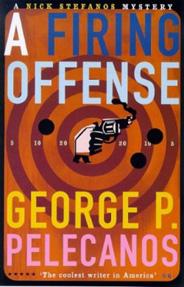
|
But your reviews show that your work is highly rated and your reputation in the genre is legendary. The New York Times gave Drama City a tremendous review! And prior to that, Hard Revolution made the best of 2004 lists all over the world! Hey, Iím not bragging, but yes Iím widely reviewed. But Drama City didnít make the bestseller lists despite the reviews, so I guess theyíre scratching their heads wondering why. Is it the social content? Or what? In a way I agree with them because Americans on the most part donít want to go there. And most people donít want to talk about my black characters as theyíre too pc. So I have to make a choice. Do I want make a 180 degree turn? Or do I want to keep on doing what Iím doing? I got a new contract with Little Brown, so Iím going to keep writing books, thatís what I do. There is concern out there, but Iím not going to stop what I do. |
|
We do not want you to stop! And that brings me to my next question, this time last year you told me that Drama City was written, as you always have a book stashed a year in advance, so have you a book ready? Nope, I havenít a book ready. The last year Iíve been jacked up on The Wire, the TV show, and now weíre into season four, but I have decided that I donít want to produce it this year as it is now really interfering with my writing. After season three was wrapped, I should have been writing, but I took a job for Spielberg and Hanks. |
|
|
Is this the film project based on your fatherís World War II experience in the South Pacific? Yes, my dad fought in WW2 as a marine in October 1944. The TV project is a South Pacific version of Band of Brothers, produced by the same team - thirteen hour-long episodes in all. I wrote two hours of it, and it took a lot of time, as it was heavily research-intensive. So this is the first time that I have no book stashed ready for my editor! |
|
|
Any news on the Curtis Hanson/Denzil Washington movie of Right as Rain and is David Benioff still involved? Yes, but there was a misquote in the papers over here, itís actually Samuel L Jackson not Denzil Washington. It is supposed to be the next project for Curtis Hanson, as David Benioff has finished the screenplay, so, as they say in Hollywood, itís the next plane off the runway. |
|
|
And Derek Strange, what are your plans for him? I think Iíll bring him back, I like Strange a lot. |
|
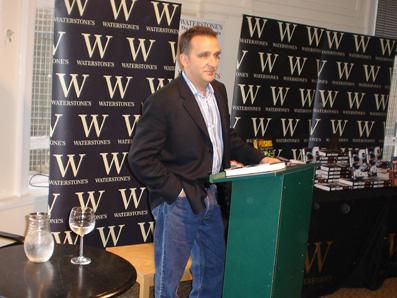
|
|
|
I share your enthusiasm vis-à-vis Little Scarlet by Walter Mosley. Can you tell us what you enjoyed about this book and Easy Rawlins as a character? I like the way he chronicles this manís life against the changing social background in the United States, and soon heíll have close to a centuryís worth of history in these entertaining crime novels. Most people would not be able to do that - they would keep the guy the same age, but Rawlins changes with the times, and Mosely is just an excellent writer. |
|
|
I see from your website that you got out your old Sony Walkman again for touring. When are you going to upgrade to an IPod? Well you look pretty successful and I was wondering if you were going to buy me one… |
|
|
Finally, George, what books have interested you over the last year? I just started John Burdettís Bangkok 8 which is great - this guyís an original. |
|
|
Wait till you read the follow-up, Bangkok Tattoo - excellent I also liked Jonathan Lethemís Fortress of Solitude, and have you been getting the Hardcase Crime books? |
|
|
Yes, I picked up the Larry Block Grifters Game and I believe that Stephen King has one out soon? Thatís right - one of them, Two-way Split by a Scottish writer Allan Guthrie, is excellent, as well as the Dominic Stansbury book which is also brilliant - I like these books, in fact I like pulps. |
|
|
George, thanks again and great to see you again, and we loved Drama City. Always a pleasure Ali, say hello to Mike Stotter for me. |
|
Shots would like to thank Gaby Young of Orion Publishing for organizing this interview.
|
|
Previous interviews and articles
|
|
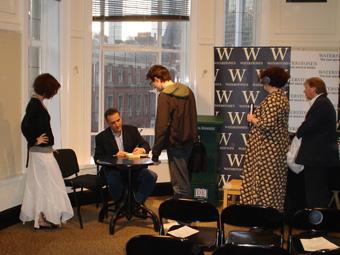
|
|
Bibliography
: -
The
Nick Stefanos books
∑
A
FIRING OFFENSE
∑
NICK'S
TRIP
∑
DOWN
THE RIVER WHERE THE DEADMEN GO
The
Washington Quartet
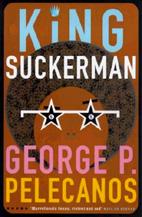
∑
THE
BIG BLOWDOWN
∑
KING
SUCKERMAN
∑
THE
SWEET FOREVER
∑
SHAME
THE DEVIL
The
Derek Strange Books
∑
RIGHT
AS RAIN
∑
HELL
TO PAY
∑
SOUL
CIRCUS
∑
HARD
REVOLUTION
Standalone
Novels
∑
SHOEDOG
∑
DRAMA
CITY
Short Story
Work
∑
MEN
FROM BOYS [ed. John
Harvey] |
|
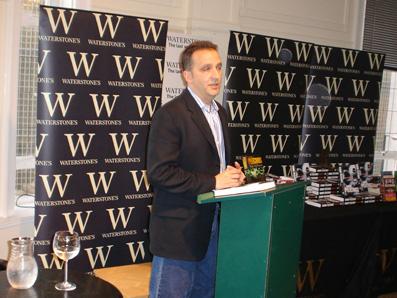
|
|
Ali S Karim is an industrial chemist, freelance journalist and book reviewer living in England. He is Assistant Editor at Shots Ezine and also contributes to January Magazine, Deadly Pleasures Magazine and Crimespree Magazine. Ali is also an associate member of The Crime Writers Association (CWA) of Great Britain as well as The International Thriller Writers Association. He is currently working on a violent techno-thriller. |
|

| Webmaster: Tony 'Grog' Roberts [Contact] |